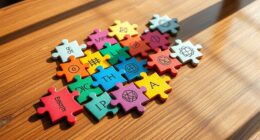According to attachment theory, opposites often attract because different attachment styles can create a sense of complementarity, fueling initial attraction. For example, someone with an anxious style may seek reassurance from a dismissive partner. However, lasting compatibility depends on understanding and managing these emotional differences. If you stay curious about how attachment styles influence your interactions, you’ll gain insights into making opposites work or recognizing when they might cause issues.
Key Takeaways
- Opposites attract when partners’ attachment styles complement, fostering growth and balance through understanding and emotional compatibility.
- Mismatched attachment styles can cause misunderstandings, but awareness and communication help turn differences into strengths.
- Emotional compatibility is crucial; contrasting personalities work best when emotional needs are recognized and respected.
- Opposing attachment styles, like anxious and avoidant, may lead to tension unless both partners develop empathy and secure bonds.
- Building emotional understanding and conflict resolution skills helps partners with contrasting traits maintain a healthy, attractive relationship.

Attachment theory explains how our early relationships shape the way we connect with others, often influencing the dynamics of our romantic partnerships. When it comes to opposites attracting, understanding this can help you see why some relationships thrive while others struggle. At its core, emotional compatibility plays a significant role in how well two people can bond, especially when their personalities contrast. If your partner’s style of expressing emotions differs from yours, it might seem challenging at first. But if both of you can navigate these differences effectively, your connection can deepen. Conversely, incompatible emotional needs can lead to misunderstandings and frustration, making conflict resolution more difficult.
When you’re with someone who is your opposite in many ways, it’s common to think that your differences will either clash or complement each other perfectly. Attachment styles influence this dynamic heavily. For example, if you have an anxious attachment style, you might crave reassurance and closeness, while your partner, with an avoidant attachment style, values independence and space. This pairing can create tension if you’re not aware of how your emotional needs intersect. But if you develop emotional compatibility — understanding and respecting each other’s attachment cues — your relationship can function smoothly. You learn to communicate your feelings openly and respond to conflicts with empathy rather than defensiveness. Recognizing how Attachment styles impact your interactions can help you navigate these differences more effectively.
Opposites attract, but understanding attachment styles is key to emotional harmony and smooth communication.
Conflict resolution becomes a key factor when opposites are involved. Your ability to handle disagreements depends largely on your understanding of each other’s emotional worlds. If you’re aware of your partner’s attachment style and emotional triggers, you can approach conflicts more productively. For instance, if your partner withdraws during disagreements, recognizing this pattern allows you to give them space without taking it personally. On the other hand, if you’re someone who needs frequent reassurance, learning to express these needs calmly helps prevent misunderstandings. The more you work on emotional compatibility, the easier it becomes to resolve conflicts constructively, even when your personalities are quite different.
Ultimately, opposites can attract if both partners prioritize emotional compatibility and are committed to developing healthy conflict resolution skills. While differences might initially seem intimidating, they can also bring balance and growth. Recognizing how attachment styles influence your relationship helps you understand why some differences are manageable and others aren’t. When you focus on building a secure emotional connection, your relationship can thrive despite—or sometimes because of—your differences. It’s all about understanding, respect, and the willingness to work through conflicts together, turning opposites into strengths rather than sources of division.
Frequently Asked Questions
Can Attachment Styles Change Over Time in a Relationship?
You might wonder if your attachment style can change over time in a relationship. The answer is yes; attachment evolution is possible, especially with conscious effort and self-awareness. Style flexibility allows you to develop healthier patterns and deepen your connection. As you grow and learn, your attachment style can adapt, leading to more secure bonds and better emotional intimacy. So, yes, change is achievable through ongoing reflection and relationship work.
How Do Attachment Styles Influence Conflict Resolution?
You influence conflict resolution through your attachment style by how you handle emotional regulation and communication patterns. If you’re secure, you’re more likely to express feelings openly and listen actively, reducing misunderstandings. An anxious attachment might cause you to react impulsively or seek reassurance, while avoidant tendencies can make you withdraw. Recognizing these patterns helps you develop healthier ways to manage disagreements, fostering better understanding and connection.
Are Certain Attachment Styles More Compatible With Opposites?
You might think attachment compatibility matters more than style mismatches, but ironically, some mismatched styles can actually complement each other. For instance, a secure partner can balance an anxious one, creating growth. Certain attachment styles are more compatible with opposites, as they foster learning and adaptation. So, while opposites attract, understanding your attachment style helps navigate whether that chemistry will lead to harmony or conflict.
What Role Does Childhood Experience Play in Attraction?
Your childhood patterns shape your emotional wiring, influencing who attracts you. If you grew up feeling secure, you might seek similar stability in others. Conversely, if your childhood involved inconsistency or neglect, you could be drawn to partners who mirror those experiences. Your early experiences unconsciously guide your attraction, as your emotional wiring seeks familiarity, comfort, or healing, depending on what your childhood taught you about love and safety.
Can Opposites With Differing Attachment Styles Maintain Long-Term Stability?
You might find that opposites with differing attachment styles struggle to maintain long-term stability because attachment compatibility is essential to emotional harmony. When your styles clash, it can create ongoing misunderstandings and insecurity. However, if both partners actively work on understanding each other’s needs and foster open communication, emotional harmony can develop over time. Ultimately, growth and mutual effort are vital for sustaining a healthy, long-lasting relationship despite differences.
Conclusion
So, whether opposites attract or not, understanding attachment styles helps you see the truth. It’s about recognizing patterns, respecting differences, and nurturing connections. It’s about embracing comfort, fostering growth, and building trust. When you know what to look for, you can turn differences into opportunities and similarities into strengths. Because, in the end, relationships thrive when you understand yourself and others — and when you choose connection over conflict, harmony over opposition.
Felicity, our Author, pens in-depth articles and guides that delve into the heart of personal discovery. Her narrative-driven approach weaves together theory, practice, and personal anecdotes, making the journey of self-exploration both relatable and inspiring. Felicity’s contributions help illuminate the path for those seeking a deeper understanding of themselves and their relationships.










